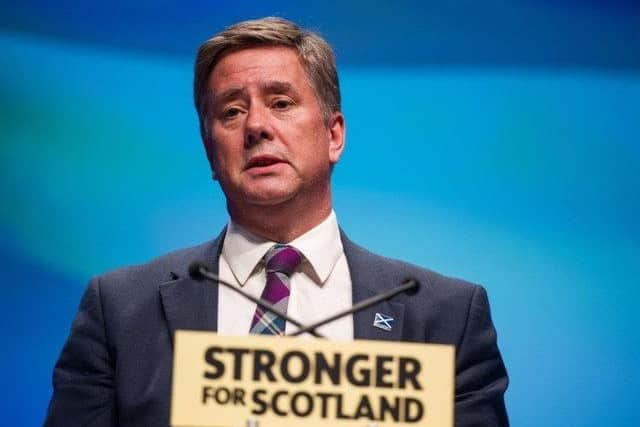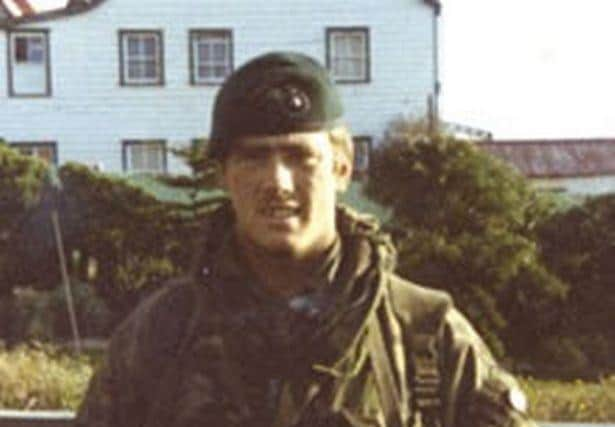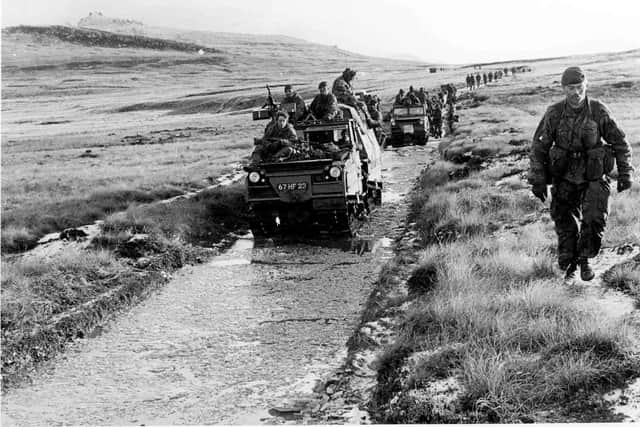Falklands War: Justice secretary Keith 'Buster' Brown on the conflict's 40th anniversary
As he and his fellow marines in 45 Commando inched their way up a mountainside pocked with rocks and steep gullies, the darkness was punctuated by a cacophony of noise and flashes. High above them, dug-in fighters from the 4th Monte Caseros regiment laid siege, unleashing heavy machine gun fire, mortars, and artillery.
“It was unlike anything I’d experienced before,” recalled the SNP’s deputy leader. “It was all going off, bangs, flashes, and tracer fire. The noise was incredible.”
Advertisement
Hide AdAdvertisement
Hide AdAt the time, the man who would become Scotland’s cabinet secretary for justice and veterans was barely out of his teens. He had left Tynecastle High a few years before and headed to the north east in search of work. But with Britain plunging into recession, the options were scarce.
One day back in Edinburgh in November 1980, he walked into the Royal Navy careers office on Lothian Road, where his eye was drawn to photographs of the Royal Marines. “I thought ‘that looks quite exciting, I’ll have a go at that’.”
By his own admission, Mr Brown had signed up to “get fit and disciplined”, and 45 Commando could guarantee both. The Arbroath-based unit’s deployments alternated between Northern Ireland and the Norwegian tundra. But come the morning of April 2, 1982, everything changed.
“I was in my bed, looking forward to some leave and getting back to spend some time in Edinburgh,” Mr Brown recalls. “It was either a tannoy or someone coming round the grots, but the message was that all leave was cancelled. Everyone assumed it was an April Fools.”


It was anything but. Earlier that day, around 3,000 Argentine special forces had invaded the Falklands, sparking the first military action since World War Two to utilise all elements of the British Armed Forces.
Mr Brown, a mortar troop signaller, set about loading up Bandvagns and trailers, but, like many of his colleagues, presumed a diplomatic solution was imminent. It was only after they left Ascension Island on the final leg of their journey to the South Atlantic archipelago that they realised the politicians might fail. “That was then the atmosphere changed,” he remembers. “People became a lot more serious.”
If that crossing in the battered “old tub” of the RFA Stromness was gruelling (“it had rats in its hold, but they took the rats out and put bunks in,” Mr Brown smiles), the welcome was no warmer at San Carlos Bay.
“It was meant to be a night-time landing, but by the time we got down the scramble-nets and into the landing craft, it was broad daylight,” he recalls. “There was small arms fire from Fanning Head into San Carlos, and then air raid warnings. It was a bit of a shooting gallery.”


Advertisement
Hide AdAdvertisement
Hide AdThe 45 Commando dug in trenches and held their position, before embarking on the legendary 56-mile yomp across the boggy, rough terrain towards Port Stanley. Mr Brown’s pack, loaded down with the heavy radio batteries, weighed around 50kg. “I remember the very first stop on that yomp,” he says. “I could only lie on my back with the pack still on. To get back up, I had to roll on to my front, bring my knees up, and push up.”
By June 11, 45 Commando was in place for the night battle on Two Sisters. The engagement was a test of not only their physical prowess, but their mental fortitude. Hours earlier, four marines – Sergeant Robert Leeming, Corporals Andrew Uren and Peter Fitton, and Marine Keith Phillips – were killed in a blue-on-blue incident.
The loss hit hard and Mr Brown felt it keenly. He still does. “Keith was the same age as me and had the same name, and his life just stopped there and then,” he reflects. “It was tragic.”


Now 40 years on, Mr Brown is preparing to return, albeit momentarily, to that old life, where he was known by his peers in 45 as ‘Buster’ Brown. “I think because I didn’t pass that nickname on to people, nobody has used it since,” he says. “But when I meet up with the guys, as I will do next month, that’s what they know me as.”
That reunion at RM Condor will bring together well-kent faces to reflect on their shared past, and the different paths they took. For Mr Brown, it was university, followed by local government and his political ascendancy with the SNP. Major General Andrew Whitehead, the commanding officer he served beside on Two Sisters, became one of Margaret Thatcher’s defence attachés in Washington.
They, and many others, will get together next month on the anniversary of that famous battle. Mr Brown did not attend his first 45 Commando reunion until 2007, when he admits he felt like a “fish out of water” at first. Asked why it took 25 years, he is plain-spoken.
“I never kept in touch … I wasn’t aware there were reunions,” he says. “I hadn’t maintained contact with anybody. Actually, I’ve now found out that that’s not an unusual thing, really.”
The demands of government ensure the 60-year-old is kept busy nowadays, but he still takes a keen interest in the Falklands. Even now, Argentina continues to make noises about its claim to the islands, a stance backed by Beijing.
Advertisement
Hide AdAdvertisement
Hide AdMr Brown sees little prospect of an Argentine escalation. “I think it’s very different to see Argentina taking the islands by force, not just because of the base [RAF Mount Pleasant] that’s now there,” he reasons. “I think the international community would be pretty dismissive. Argentina is not Russia.
“If the islanders want to be part of the UK – and they expressed that in a referendum – I think that should be the final word.”
Comments
Want to join the conversation? Please or to comment on this article.